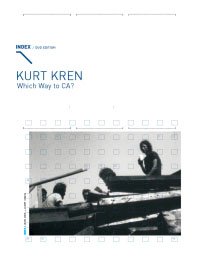INDEX #020: Kurt Kren - Which Way to CA?
Which Way to CA? collects 18 films from 1968-1990 by the late pioneer of structural film, Kurt Kren. Born in Vienna in 1929, his filmic experiments spanned almost five decades, during which he reconsidered montage, animation, and the documentation of audiovisual events from a truly unique perspective. Includes 26/71: Cartoon: Balzac and the Eye of God and No Film among others. - Facets Description
Following on from Index’s previous Kurt Kren compilations, Action Films and Structural Films, Which Way to CA? gathers the filmmaker’s “documentary” works. Of course, any such term becomes extremely slippery when applied to Kren, hence the inverted commas. You could argue, for example, that his capturing of various performances by Gunter Brüs or Otto Mühl constitutes documentary representations even though their editing structures make them distinctly “experimental” in execution. Similarly some of the titles which figured on the Structural Films disc could happily earn the documentary tag courtesy of the manner in which they capture the landscapes around them; I’m thinking, in this case, of the likes of 31/75 Asyl and 37/78 Tree Again. Indeed, even this particular disc has difficulty staying within its own remit. 26/71 Zeichenfilm – Balzac und das Auge Gottes is a 31-second animation which prefigures the work Phil Mulloy has been putting out since the early nineties. 42/83 No Film, even shorter at just three seconds, is just that: the words “No Film” onscreen for what seems like barely a moment.
So what is a Kren documentary? Hardly surprising, it appears to take on a number of forms. Early on in the (chronologically arranged) disc we find the likes of 18/68 Venecia Kaputt and 22/69 Happy-End. The former scrawls apocalyptic doodles over footage of Venice; the latter offers askew, barely-in-the-frame representations of Kren’s trips to the cinema (Bullitt’s famous car chase is amongst the near-unrecognisable snippets on slight display) interrupted by images of hardcore sexual imagery. In other words this is documentary as situationist prank; Kren having a little chuckle into his sleeve and inviting us, perhaps, to laugh along too.
But then this isn’t all that Which Way to CA? has to offer. Elsewhere various shorts see Kren providing documentary as distillation, reducing events, activities and meanderings to their very essentials. In some cases the results are initially abstract and allow their realities to slowly creep in: 24/70 Western’s representation of a photo depicting the aftermath of the My Lai massacre in Vietnam is a key example. Other films are more immediately perceivable: 34/77 Tschibo captures Kren’s notes from previous projects in small frame bursts thus creating an onslaught of instantly recognisable, yet ultimately incomprehensible, words and doodles; 23/69 Underground Explosion is a chaotic blend of sound and image recording a festival featuring, amongst others, Amon Düul and VALIE EXPORT in a manner which captures its atmosphere just as astutely in five minutes as Michael Wadleigh’s Woodstock does over three-hours-plus.
In this latter respect a number of these films recall some of Derek Jarman’s earliest Super 8 experiments: TG in Heaven (proto-industrial band Throbbing Gristle performing at the eponymous nightclub), Pirate Film (featuring William Burroughs and Sloane Square: A Room of One's Own, this latter example essentially a home movie. Indeed, home movie is a key term when it comes to some of Which Way to CA?’s content. Kren himself even uses the expression “bad home movies” in respect of the completely amateurish nature in which he only edited in camera for a handful of these shorts, never knowing quite what the end results would be until the films were ready for their first viewing. As such the spectre of Andy Warhol’s filmic output is also present when viewing the disc. Of course, Warhol’s lack of editing was done in conjunction with simply leaving the camera running and producing long takes as opposed to the chaotic series of bursts which Kren gives us. Nevertheless, the lack of after-the-fact manipulation leads to an unavoidable sense that reality is in some way being captured. You could even argue, therefore, that these particular titles – amongst them 40/81 Breakfast im Grauen and the film which gives this compilation its title, 39/81 Which Way to CA? - are documentary expressions in their purest form: only reality, nothing else.
There’s one further facet to these films worth mentioning and that’s their often incredible visual beauty. 40/81 Getting Warmer, whether intentional or not, has a lovely off-kilter colour balance which brings out the reds and the greens. 33/77 Keine Donau attains a texture akin to either animation or genuine 3D. And then there’s 43/84 1984, Kren’s contribution to documenting American politics. Shooting a pre-election televised debate featuring Ronald Reagan, this short is oddly reminiscent of one of David Lynch’s more bizarre impulses. It’s a thing of strange beauty and one of the most beguiling pieces of cinema I’ve ever seen. - DVDTIMES REVIEW
DVD Contents:
18/68 VENECIA KAPUTT 1968, 0:20 min, 22/69 HAPPY-END 1969, 4:02 min, 23/69 UNDERGROUND EXPLOSION 1969, 5:07 min, 24/70 WESTERN 1970, 2:54 min, 26/71 ZEICHENFILM BALZAC UND DAS AUGE GOTTES 1971, 0:31 min, 27/71 AUF DER PFAUENINSEL 1971, 1:21 min, 29/73 READY-MADE 1973, 12:20 min, 30/73 COOP CINEMA AMSTERDAM 1973, 3 min, 33/77 KEINE DONAU 1977, 8:16 min, 34/77 TSCHIBO 1977, 1:58 min, 39/81 WHICH WAY TO CA? 1981, 3:18 min, 40/81 BREAKFAST IM GRAUEN 1981, 3:13 min, 41/82 GETTING WARM 1982, 3:22 min, 42/83 NO FILM 1983, 0:03 min, 43/84 1984 1984, 1:43 min, 44/85 FOOT´- AGE SHOOT´- OUT 1985, 3:03 min, 46/90 FALTER 2 1990, 0:30 min, 50/96 SNAPSPOTS (for Bruce) 1996, 4:12 min, SPECIAL FEATURE: HANS SCHEUGL: KEINE DONAU - Kurt Kren und seine Filme 1988, 55 min
